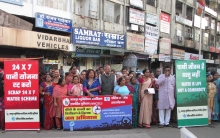Water sector reforms in India

Gaurav Dwivedi, a water expert from Manthan Adhyayan Kendra, has prepared an overview of water sector reforms in India. Manthan Adhyayan Kendra is a centre set up to research, analyse and monitor water and energy issues from the perspective of just, equitable and sustainable development.
During the past decade and half, India has seen reforms to the water sector based on the financial sustainability model put forward by the international institutions. These reforms are based on principles like full cost recovery, rationalisation of water tariffs, privatisation, and public-private partnerships across urban, rural and agricultural sub-sectors. They are paving the way for privatisation, commercialisation and commodification of the water sector.
The efforts to privatise water services have been undertaken through various international institutions such as the World Bank, the Asian Development Bank, and the International Finance Corporation. These institutions have funded projects and national programs like Jawaharlal Nehru National Urban Renewal Mission, Urban Infrastructure Development Scheme in Small and Medium Towns and now under the SMART city initiative and the AMRUT plan for urban development.
Where private participation of urban services is envisaged, user costs will be required for covering the expenses of such services, including domestic water supplies. In Madhya Pradesh, specific state schemes like Chief Minister's Urban Water Supply Scheme and Madhya Pradesh Jal Nigam in Madhya Pradesh look to continue the principles of the reform model.
Under these schemes, privatisation measures are being implemented in several towns and cities across the country despite people's opposition. In some places these projects were halted due to immense public pressure, including in Delhi, Mumbai, Bangalore, Latur and Mysore, among others. However, despite these setbacks, the steps to privatise continue and water services are being handed over to private control in places like Nagpur, Hubli-Dharwad, Khandwa, Tiruppur, Shivpuri, Patna, Guwahati, Naya Raipur, Mangalore, Kolkata, Ludhiana and Dewas, among many others.
Read full text on The blue planet project website.
More information:

